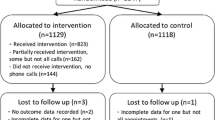Abstract
Patients scheduled for primary care appointments often cancel or no show. For diabetic patients, nonattendance can affect continuity of care and result in higher emergency department (ED) and hospital use. Nonattendance also impacts appointment scheduling, patient access, and clinic work load. While no show has received significant attention, little research has addressed the prevalence and impact of appointment cancellation. Data on 46,710 appointments for 7586 adult diabetic patients was used to conduct a prospective cohort study examining primary care appointment behavior. The independent variable was the status of the INDEX appointment, which was attended, cancelled, or no showed. Dependent variables included the dates of (1) the last attended appointment, (2) scheduling the NEXT appointment, (3) the next attended follow-up appointment, and (4) ED visits and hospitalizations within six months of the INDEX. Cancellation was more prevalent than no show (17.7% vs 12.2%). Of those who cancelled and scheduled a next appointment, 28.8% experienced over 30 days delay between the INDEX and NEXT appointment dates, and 59.9% delayed rescheduling until on or after the cancelled appointment date. Delay in rescheduling was associated with an 18.6% increase in days between attended appointments and a 26.0% increase in ED visits. For diabetic patients, cancellation with late rescheduling is a prevalent and unhealthy behavior. Although more work is necessary to address the health, intervention, and cost issues, this work suggests that cancellation, like no show, may be problematic for many clinics and patients.

Similar content being viewed by others
References
Bean, A., and Talaga, J., Appointment breaking: causes and solutions. J. Health Care Mark. 12(4):14–25, 1992.
Bowser, D., Utz, S., Glick, D., and Harmon, R., A systematic review of the relationship of diabetes mellitus, depression, and missed appointments in a low-income uninsured population. Arch. Psychiatr. Nurs. 24(5):317–329, 2010.
Denhaerynck, K., Manhaeve, D., Dobbels, F., Garzoni, D., Nolte, C., and De Geest, S., Prevalence and consequences of nonadherence to hemodialysis regimens. Am. J. Crit. Care. 16(3):222–235, 2007.
Deyo, R., and Inui, T., Dropouts and broken appointments: a literature review and agenda for future research. Med. Care. 18(11):1146–1157, 1980.
Garuda, S., Javalgi, R., and Talluri, V., Tackling no-show behavior: a market-driven approach. Health Mark. Q. 15(4):25–44, 1998.
George, A., and Rubin, G., Non-attendance in general practice: a systematic review and its implications for access to primary health care. Fam. Pract. 20(2):178–184, 2004.
Griffin, S., Lost to follow-up: the problem of defaulters from diabetes clinics. Diabet. Med. 15(Suppl 3):S14–S24, 1998.
Macharia, W., Leon, G., Rowe, B., Stephenson, B., and Haynes, R., An overview of interventions to improve compliance with appointment keeping for medical services. JAMA. 267(13):1813–1817, 1992.
Rowett, M., Reda, S., and Makhoul, S., Prompts to encourage appointment attendance for people with serious mental illness. Schizophr. Bull. 36(5):910–911, 2010.
Turkcan, A., Nuti, L., DeLaurentis, P., et al., No-show modeling for adult ambulatory clinics. In: Denton, B. (Ed.), Handbook of healthcare operations management. Springer, New York, pp. 251–288, 2013.
Campbell, J., Chez, R., Queen, T., Barcelo, A., and Patron, E., The no-show rate in a high-risk obstetric clinic. J. Womens Health Gend. Based Med. 9(8):891–895, 2000.
Cohen, A., Dreiher, J., Vardy, D., and Weitzman, D., Nonattendance in a dermatology clinic – a large sample analysis. J. Eur. Acad. Dermatol. Veneorol. 22(10):1178–1183, 2008.
Compton, M., Rudisch, B., Craw, J., Thompson, T., and Owens, D., Predictors of missed first appointments at community mental health centers after psychiatric hospitalization. Psychiatr. Serv. 57(4):531–537, 2006.
Gany, F., Ramirez, J., Chen, S., and Leng, J., Targeting social and economic correlates of cancer treatment appointment keeping among immigrant Chinese patients. J. Urban Health. 88(1):98–103, 2011.
Herrick, J., Gilhooly, M., and Geddes, D., Non-attendance at periodontal clinics: forgetting and administrative failure. J. Dent. 22(5):307–309, 1994.
Kalb, L., Freedman, B., Foster, C., et al., Determinants of appointment absenteeism at an outpatient pediatric autism clinic. J. Dev. Behav. Pediatr. 33(9):685–697, 2012.
Liew, S., Tong, S., Lee, V., Ng, C., Leong, K., and Teng, C., Text messaging reminders to reduce non-attendance in chronic disease follow-up: a clinical trial. Br. J. Gen. Pract. 59(569):916–920, 2009.
Markowitz, J.T., Volkening, L.K., and Laffel, L.M., Care utilization in a pediatric diabetes clinic: cancellations, parental attendance, and mental health appointments. J. Pediatr. 164(6):1384–1389, 2014.
Obialo, C., Bashir, K., Goring, S., et al., Dialysis “no-shows” on Saturdays: implications of the weekly hemodialysis schedules on nonadherence and outcomes. J. Natl. Med. Assoc. 100(4):412–419, 2008.
Snow, B., Cartwright, P., Everitt, S., Ekins, M., Maudsley, W., and Aloi, S., A method to improve patient access in urological practice. J. Urol. 182(2):663–667, 2009.
Tseng, F., Non-attendance in endocrinology and metabolism patients. J. Formos. Med. Assoc. 109(12):895–900, 2010.
Tuller, D., Bangsberg, D., Senkungu, J., Ware, N., Emenyonu, N., and Weiser, S., Transportation costs impede sustained adherence and access to HAART in a clinic population in southwestern Uganda: a qualitative study. AIDS Behav. 14(4):778–784, 2010.
Daggy, J., Lawley, M., Willis, D., et al., Using no-show modeling to improve clinic performance. Health Informatics J. 16(4):246–259, 2010.
Hixon, A., Chapman, R., and Nuovo, J., Failure to keep clinic appointments: implications for residency education and productivity. Fam. Med. 31:627–630, 1999.
Johnson, B., Mold, J., and Pontious, J., Reduction and management of no-shows by family medicine residency practice exemplars. Ann. Fam. Med. 5:534–539, 2007.
Mehrotra, A., Keehl-Markowitz, L., and Ayanian, J., Implementing open-access scheduling of visits in primary care practices: a cautionary tale. Ann. Intern. Med. 148:915–922, 2008.
Lehmann, T., Aebi, A., Lehmann, D., Olivet, M.B., and Stalder, H., Missed appointments at a Swiss university outpatient clinic. Public Health. 121:790–799, 2007.
Kaplan-Lewis, E., and Percac-Lima, S., No-show to primary care appointments why patients do not come. J. Prim. Care Community health. 4(4):251–255, 2013.
Davies, M.L., Goffman, R.M., May, J.H., et al., Large-scale no-show patterns and distributions for clinic operational research. In Healthcare. 4(1):15, 2016.
Davidson, M., Karlan, V., and Hair, T., Effect of a pharmacist-managed diabetes care program in a free medical clinic. Am. J. Med. Qual. 15(4):137–142, 2000.
Karter, A., Parker, M., Moffet, H., et al., Missed appointments and poor glycemic control: an opportunity to identify high-risk diabetic patients. Med. Care. 42(2):110–115, 2004.
Nuti, L., Lawley, M., Turkcan, A., et al., No-shows to primary care appointments: subsequent acute care utilization among diabetic patients. BMC health services research. 12:304, 2012.
Rhee, M., Wrenn, S., Ziemer, D., Culler, S., Cook, C., El-Kebbi, I., et al., Patient adherence improves glycemic control. Diabetes Educ. 31(2):240–250, 2005.
Samuels, T., Bolen, S., Yeh, H., et al., Missed opportunities in diabetes management: a longitudinal assessment of factors associate with sub-optimal quality. J. Gen. Intern. Med. 23(11):1770–1777, 2008.
Schectman, J., Schorling, J., and Voss, J., Appointment adherence and disparities in outcomes among diabetic patients. J. Gen. Intern. Med. 23(10):1685–1687, 2008.
Mtuya, C., Cleland, C.R., Philippin, H., et al., Reasons for poor follow-up of diabetic retinopathy patients after screening in Tanzania: a cross-sectional study. BMC Ophthalmol. 16(1):1, 2016.
Corfield, L., Schizas, A., Noorani, A., and Williams, A., Non-attendance at the colorectal clinic: a prospective audit. Ann. R. Coll. Surg. Engl. 90(5):377–380, 2008.
Chakraborty, S., Muthuraman, K., and Lawley, M., Sequential clinical scheduling with patient no-shows and general service time distributions. IIE Trans. 42(5):354–366, 2010.
Feldman, J., Liu, N., Topaloglu, H., and Ziya, S., Appointment scheduling under patient preference and no-show behavior. Oper. Res., 2014. doi:10.1287/opre.2014.1286.
Lin, J., Muthuraman, K., and Lawley, M., Optimal and approximate algorithms for sequential clinical scheduling with no-shows. IIE Trans. Healthcare Syst. Eng. 1(1):20–36, 2011.
Liu, N., Ziya, S., and Kulkarni, V., Dynamic scheduling of outpatient appointments under patient no-shows and cancellations. Manuf. Serv. Oper. Manag. 12(2):347–364, 2010.
Muthuraman, K., and Lawley, M., A stochastic overbooking model for outpatient clinical scheduling with no-shows. IIE Trans. 40(9):820–837, 2008.
Zacharias, C., and Pinedo, M., Appointment scheduling with no-shows and overbooking. Prod. Oper. Manag. 23(5):788–801, 2014.
Zeng, B., Turkcan, A., Lin, J., and Lawley, M., Clinic scheduling models with overbooking for patients with heterogeneous no-show probabilities. Ann. Oper. Res. 178(1):121–144, 2010.
Weinger, K., McMurrich, S., Yi, J., Lin, S., and Rodriguez, M., Psychological characteristics of frequent short-notice cancellers of diabetes medical and education appointments. Diabetes Care. 28(7):1791–1793, 2005.
Norris, J., Kumar, C., Chand, S., Moskowitz, H., Shade, S., and Willis, D., An empirical investigation into factors affecting patient cancellations and no-shows at outpatient clinics. Decis. Support. Syst. 57:428–443, 2014.
McDonald, C., Overhage, M., Tierney, W., et al., The Regenstrief medical record system: a quarter century experience. Int. J. Med. Inform. 54(3):225–253, 1999.
DeGroot, M., Schervish M. Probability and statistics. Addison-Wesley, third edition, 2002.
Bland, J.M., and Altman, D.G., Multiple significance tests: the Bonferroni method. BMJ. 310(6973):170, 1995.
Author information
Authors and Affiliations
Corresponding author
Ethics declarations
Funding
No research funding to report.
Conflict of Interest
No conflicts of interest to report.
Ethical Approval
All procedures performed were in accordance with the ethical standards of the institutional and/or national research committee and with the 1964 Helsinki declaration and its later amendments or comparable ethical standards.
Informed Consent
No informed consent was required. Analyses were performed using a Limited Data Set.
Additional information
This article is part of the Topical Collection on Systems-Level Quality Improvement
Rights and permissions
About this article
Cite this article
McComb, S., Tian, Z., Sands, L. et al. Cancelled Primary Care Appointments: A Prospective Cohort Study of Diabetic Patients. J Med Syst 41, 53 (2017). https://doi.org/10.1007/s10916-017-0700-0
Received:
Accepted:
Published:
DOI: https://doi.org/10.1007/s10916-017-0700-0




